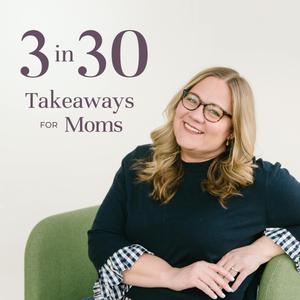
The Shameless Mom Academy
Sara Dean
- 25 minutes 13 seconds922: LEADERSHIP STORIES: Use My GAP Strategy to Communicate in Difficult Conversations
Have you ever gone to someone you trusted to seek help and they became defensive instead of holding space for you?
Have you ever been in a conversation and felt yourself getting defensive as someone shared information with you?
You’ve likely been in both of these situations at some point, perhaps in personal and professional settings.
I found myself in the first situation a while back. I took a very serious concern to two leaders I trusted and I left feeling stunned that two leaders I trusted couldn’t hold space for me in a vulnerable moment. It was so disappointing and left me reeling for days. I kept rerunning the conversation in my head trying to figure out what went wrong and why I felt so defeated and hurt after the fact.
With some time and reflection, I was able to identify that the reason I was so upset was because I didn’t feel seen, heard, held, or valued in a moment where it felt really important to me to feel seen, heard, held, and valued.
As I processed this event, I spent a lot of time thinking about how I would have handled the situation if the tables were turned. I questioned myself, “How do I hold space for people when they show up and need me to sit with them and hear them out - even if what they want to share is difficult to hear?”
My work demands this of me. I have to sit in hard conversations with coaching clients all the time. I preach confident communication to leaders all day long. I started to think through what my specific process is when it comes to holding space for others and I was able to put it together in a really clear and simple way that can be easily replicated in many different sticky situations and tough moments.
In this episode, I talk you through how to use my 3 step process, my GAP Strategy, to practice Gratitude, Acknowledgement, and Partnership in these challenging communication moments. I give you brief, clear statements you can use to immediately help the person sitting across from you feel seen, heard, held, and valued. These are the statements I wished I had heard in that conversation a while back. I wish the people who sat across from me were able to apply this strategy so we could have worked together toward a solution instead of leaving the situation feeling awkward, incomplete, and let down.
It is my hope that learning and practicing my GAP Strategy will allow you to hold space for others in a way that advances your relationships and your leadership.
We love the sponsors that make this show possible! You can always find all the special deals and codes for all our current sponsors on our website: https://shamelessleadership.com/sponsor.
Interested in becoming a sponsor of the Shameless Mom Academy? Email our sales team at [email protected].
Learn more about your ad choices. Visit megaphone.fm/adchoices
14 January 2025, 8:00 am - 30 minutes 28 seconds921: LEADERSHIP STRATEGIES: Essential Questions for Planning Your New Year
Every year I host an Annual Planning Workshop for my business coaching clients. This is a time for folks to look back at their wins from the past year, do some visioning for the upcoming year, and get crystal clear on the specific strategies and action steps they want to take to be successful in the new year.
As I was leading this workshop in early December, it occurred to me that you all, my lovely leader listeners, could benefit from the same exercises I take my business coaching clients through. In this episode, I walk you through 10 simple, but essential, questions to ask yourself as you plan your upcoming year.
I don’t believe in resolutions. I don’t believe you need to flip your life upside down and make 734 changes on January 1st. I do believe you need to own wins from the past year so you can see the proof of what you’re capable of moving forward. And, I do believe that you should take some time to reflect on what you want to make happen over the course of the next year sometime in the month of January so you can begin to build the necessary momentum to actually accomplish all you want to accomplish in the next year.
Here are the 10 questions I walk you through in this episode:
- What are my 2024 wins?
- What do I want more of in 2025?
- What do I want less of in 2025?
- What do I want to be most proud of on December 31, 2025?
- What are my Big 3 for 2025?
- Why do these Big 3 matter to me?
- What support do I need to go after and accomplish my Big 3?
- What will change for me when I attain my Big 3?
- What are the costs of not attaining these Big 3 this year?
- What specific steps will I take in the next 90 days to work toward my Big 3?
Like many recent years, 2025 will be a year of change, uncertainty, and quite possibly chaos. The more you can be clear on what you want to accomplish, why you want to accomplish it, and how you’re going to accomplish it, the more you can stay grounded when the going (inevitably) gets tough.
Happy 2025! You got this and I’m thrilled to be on this journey with you!
Link Mentioned
- To get notified of my upcoming events, workshops, and retreats for leaders, email me at [email protected] with the subject line “Events!” and I’ll make sure to notify you as I roll out 2025 events!
We love the sponsors that make this show possible! You can always find all the special deals and codes for all our current sponsors on our website: https://shamelessleadership.com/sponsor
Interested in becoming a sponsor of the Shameless Mom Academy? Email our sales team at [email protected].
Learn more about your ad choices. Visit megaphone.fm/adchoices
7 January 2025, 8:00 am - 25 minutes 6 seconds920: LEADERSHIP STORIES: How to Use Storytelling as a Form of Authentic Leadership
I have used stories in leadership for some time now and have found them to be such a powerful way to engage people as well as a means to appeal to people’s heads and hearts. Years ago, I started studying how other speakers I followed used stories and I took notes.
As I’ve learned more about the power of storytelling from a theoretical perspective, so much has clicked for me in terms of how to use storytelling as a leadership tool and strategy. There is no doubt that stories drive authentic leadership, allowing you to humanize yourself and display vulnerability in front of those you lead. This can be pivotal in building trusting relationships. If you’re looking to build trust, cultivate vulnerability, and build team relationships on a foundation of psychological safety, start telling stories.
Daniel Coyle, author of The Culture Code, reminds those leading others through change, “Stories are not just stories; they are the best invention ever created for delivering mental models that drive behavior.”
In the vulnerable space of a story is an opportunity to create a connection. Connections pave the way for relationships. Relationships become the platform for which we can show our full range of humanity and hold space for other's full range of humanity.
Stories can be used to inspire, motivate, build trust & rapport, model humanity, humility, vulnerability, imperfection, instruct, demonstrate, teach, mentor, celebrate, and advance organizational culture.
I often have the opportunity to teach leaders how to use stories during leadership training I facilitate. It is one of my favorite activities to facilitate and to observe. Most leaders walk away feeling a sense of lightness in their leadership they couldn’t previously find. For many, this lightness is a gratitude for the permission to share parts of themselves that are imperfect, goofy, messy, soft, sensitive, joyful, and playful.
In this episode, we will talk through how to use stories, as well as tips for telling impactful stories.
Links mentioned:
- Book: The Culture Code by Daniel Coyle
- Check out my other podcast: The Shameless Mom Academy
- Learn about my speaking, training, and coaching: saradean.com
- Connect with me on LinkedIn: saradean.com/linkedin
We love the sponsors that make this show possible! You can always find all the special deals and codes for all our current sponsors on our website: https://shamelessleadership.com/sponsor
Interested in becoming a sponsor of the Shameless Mom Academy? Email our sales team at [email protected].
Learn more about your ad choices. Visit megaphone.fm/adchoices
31 December 2024, 8:00 am - 32 minutes 13 seconds919: LEADERSHIP MINDSET: 5 Competitive Advantages of Women Leaders in 2025
In the last episode of Shameless Leadership, I spoke about 5 Challenges Facing Women Leaders in 2025. While that episode had plenty of reasons to get us motivated and fired up, I am excited to kick off a conversation that leads with a positive edge this week.
When we only focus on the challenges we face as women (or as a member of any marginalized group), it can feel harder to harness our power. So, how about we focus on our competitive edges, shall we?
In this episode, I’m so excited to talk through with you the following 5 Competitive Advantages of Women Leaders 2025:
- Emotional Intelligence and Psychological + Relationship Leadership
- Innate Adaptability, Adaptivity, and Resilience
- Capacity for Ethical Development and Innovation
- Modeling and Creation of Futuristic Leadership Paradigms
- Competency in Creating Connections and Advancing Ecosystem Development
There are many aspects of our socialization as women that we tend to under leverage in leadership. Enough of that. 2025 is a year to create opportunities for us to lead in areas where our male counterparts often fall short (often due to their socialization). We have a unique opportunity to lead with our differences, intentionally do things differently, and be culture shifters and culture shapers who challenge the status quo and change patterns of socialization altogether.
By harnessing our emotional intelligence and relationship-building skills, we can create more collaborative work environments that drive better business outcomes. By embracing our natural ability to see systemic interconnections and balance multiple perspectives, we can excel at complex problem-solving and change management. By amplifying our adaptability and adaptivity (and knowing the difference between the two), we can demonstrate creative resource allocation and strategic prioritization while driving innovation. See, I told you there is a lot to get fired up about here.
2025 is not a year for us to sit back. It’s a year for us to stand up, get loud, and own our place in the game.
Link mentioned:
Shameless Leadership Episode 917: The 5 Biggest Challenges Facing Women Leaders in 2025
We love the sponsors that make this show possible! You can always find all the special deals and codes for all our current sponsors on our website: https://shamelessleadership.com/sponsor
Interested in becoming a sponsor of the Shameless Mom Academy? Email our sales team at [email protected].
Learn more about your ad choices. Visit megaphone.fm/adchoices
24 December 2024, 8:00 am - 36 minutes 58 seconds918: LEADERSHIP TIPS: The Biggest Challenges Facing Women Leaders in 2025
To be honest, I was hesitant to spend thirty minutes pointing out the challenges facing women leaders, as I’m not sure we need to be reminded of what’s not working in our favor. However, as I started putting my notes together, I quickly decided that if I provide this list as a bit of a “Hey friends! Just a heads up…” and included some options for strategic responses we can all enter 2025 feeling better informed and well prepared to do our work to the best of our ability.
So, here we go!!
For me (and I hope for you!), when the world gets messy, my values become more clear. When my values are more clear, my decision-making becomes easier. When decision-making is easier, I can mitigate a lot of mental gymnastics and get to work.
In 2025, I plan to get to work. I’m not wasting time dilly-dallying in decision fatigue. I am clear on my values, the work I want to do, the impact I want to have, and how I can best share my gifts with the world. I am ready to GO.
I am acutely aware of those who are relying on me to be clear-headed and focused. I am prepared to show up for them. In calling out our challenges and creating strategic responses, we can focus on our vision and stay in momentum even when things are falling apart around us.
In this episode, I address these 5 challenges facing women leaders in 2025:
Professional Landscape Challenges
- Persistent Gender Inequities
- Technological Disruption, Distraction, and Bias
- Emotional Labor and Mental Health Management
- Unsupported Caregiving + Sandwiching
- Systemic Chronic Inner Critic, Imposter Syndrome, and Poor Confidence
After I talk through these challenges, I provide strategic suggestions which I hope will offer you some HOPE. Will 2025 be hard? Absolutely. But, hard isn’t new to us. So, we got this.
We love the sponsors that make this show possible! You can always find all the special deals and codes for all our current sponsors on our website: https://shamelessleadership.com/sponsor
Interested in becoming a sponsor of the Shameless Mom Academy? Email our sales team at [email protected].
Learn more about your ad choices. Visit megaphone.fm/adchoices
17 December 2024, 8:00 am - 29 minutes 29 seconds917: LEADERSHIP STRATEGIES: Great Leaders Model Being Messy
This might sound counterintuitive, but great leaders aren’t afraid to be a little messy. Being messy is not a hall pass to be careless or cause harm. Being messy is about being your most authentic, imperfect, high-integrity self who isn’t afraid to make mistakes and be fumbly in front of others. This is an invitation for women leaders to embrace and model imperfection as a transformative professional strategy. Being an imperfect, messy-at-times leader can be a massive demonstration of strength, self-trust, and confidence. Leading with this level of vulnerability challenges long-standing workplace myths about how women should show up at work while deconstructing the unrealistic expectation that we must be superhuman performers. This opens the door to reimagining leadership as a dynamic, authentic, constantly evolving-for-the-better journey of continuous learning and growth.
In this episode, I unpack how modeling mistakes creates psychological safety within teams and organizations, reducing a culture of anxiety and fear of failure. By openly acknowledging our own learning processes rather than putting on airs about having it all figured out, women leaders can dismantle harmful stereotypes that suggest competence at work requires flawless execution. I also share how emotional intelligence and genuine self-awareness actually build deeper, more trusting relationships, signaling to team members that professional development can be a non-linear path filled with exciting opportunities for innovation, self-improvement, and personal transformation.
If we check our egos, let go of our internalized perfectionism, and embrace the humility that comes with not having to get it 100% right all the time, we will start to see that being imperfect, modeling learning from mistakes in live time, and letting others know that we don’t always get it 100% right is the pathway to building trust, advancing relationships, unlocking creativity, and driving better outcomes.
We love the sponsors that make this show possible! You can always find all the special deals and codes for all our current sponsors on our website: https://shamelessleadership.com/sponsor
Interested in becoming a sponsor of the Shameless Mom Academy? Email our sales team at [email protected].
Learn more about your ad choices. Visit megaphone.fm/adchoices
10 December 2024, 8:00 am - 25 minutes 53 seconds916: LEADERSHIP MINDSET: A New Leadership Paradigm Where Winning Doesn’t Equate Worth
Through my own evolution as a business owner in recent years and then through watching my son evolve as an athlete recently, I’ve had the opportunity to personally and professionally consider how our culture's obsession with performance and winning consistently creates toxic narratives that tend to diminish our inherent human value. In this episode, I do a deep dive into separating self-worth from achievement - something I have had to work really hard on as someone who likes to achieve, achieve, achieve at every turn! I have found that when we let go of our ego and lead with an intentional combination of heart and heart and a healthy dose of self-compassion, we begin to own our inherent worth rather than constantly trying to earn it, allowing us to redefine our success in more fulfilling ways that extend far beyond traditional parameters.
I am hoping leaders—especially women who have been conditioned to prove their worth through constant high achievement—will find this episode liberating. This is an invitation to untie your self-worth from external validation and implement new strategies for developing a more curious, compassionate, growth-oriented mindset.
As you consider how you judge yourself, how you judge others, and how you demonstrate a sense of self-worth to the world, I invite you to think about what would it be like if you disconnected your self-worth from winning, success, and high achievement at every turn. What would it be like if you knew you were innately worthy no matter how you performed? What would it be like if you could confidently walk onto the proverbial field without fear of peer judgment? And, if your life and/or work plays out on a field of constant judgment, what would it be like to find another field to play on?
This episode is an opportunity to challenge the traditional leadership paradigm by suggesting that true power comes not from constant winning, but from understanding our intrinsic value, supporting collective growth, and co-creating psychologically safe environments. My hope is that you'll see yourself—and your potential—through new eyes, unshackled from the damaging belief that your value is something to be constantly proven.
We love the sponsors that make this show possible! You can always find all the special deals and codes for all our current sponsors on our website: https://shamelessleadership.com/sponsor
Interested in becoming a sponsor of the Shameless Mom Academy? Email our sales team at [email protected].
Learn more about your ad choices. Visit megaphone.fm/adchoices
3 December 2024, 8:00 am - 25 minutes 43 seconds915: INCLUSIVE LEADERSHIP: The Importance of Establishing a Sense of ‘Place’ to Create Safe Spaces
As you spend time within your team and organization ideating, creating, and growing, are you conscientiously co-creating a place where each person can participate fully with their best gifts? Is there enough safety and trust for people to take creative risks and ask seemingly silly questions? Have you created a culture where people feel safe to make mistakes?
An excerpt from an exhibition on place at the National Museum of African American History and Culture, Washington DC defines “place” as… “about geography - but also about memory and imagination. People make places even as places change people. Places are secured by individual and collective struggle and spirit. Place is where culture is made, where traditions and histories are kept and lost, where identities are created, tested, and reshaped over time.”
When we think about the places you co-create with those you lead, how are you creating a place with intentionality and sensitivity to the impact that place will have on all those who inhabit it? People make up a place and each person’s unique gifts, talents, and struggles make that place entirely unique. For a place to be secure enough to build culture and traditions, there must be a foundation where the basic needs of security and safety are met. People must have enough trust in this place and the people who inhabit it that they can show up without fear of judgment, criticism, or harm. From there, the people can co-create a place where members can connect with others over shared values, common goals, and a similar sense of meaning and purpose.
In this episode, we talk about the importance of place, the steps to take to establish place, and how to overlap and collaborate with other people in other places in mutually beneficial and ethical ways.
Links and Resources Mentioned:
- Shameless Leadership Episode 906: The Myth of “Safe Spaces”
- National Museum of African American History and Culture
- Gonzaga University Center for Community Engagement
We love the sponsors that make this show possible! You can always find all the special deals and codes for all our current sponsors on our website: https://shamelessleadership.com/sponsor
Interested in becoming a sponsor of the Shameless Mom Academy? Email our sales team at [email protected].
Learn more about your ad choices. Visit megaphone.fm/adchoices
26 November 2024, 8:00 am - 29 minutes 57 seconds914: LEADERSHIP MINDSET: How to Reframe Shame
Shame can be a pervasive and isolating experience, but by examining your relationship with shame more closely, you can gain the tools to understand better and transform it. When you’re experiencing shame, it’s important to ask yourself a series of thoughtful questions designed to break down shame’s hold over you. These questions begin by addressing the specifics of a situation, identifying your feelings about the situation, and acknowledging the story you’re telling yourself about the situation. Recognizing the stories that fuel your shame can be the first powerful step toward reframing them in a way that aligns with your true values and goals.
When you challenge shame with curiosity, asking yourself, “What else is true in this situation?”, “What is mine to own here?”, and “What is not mine to own here?”, you can more accurately assess how you want to untangle your shame in order to move forward from it with valuable lessons learned. By considering both responsibility and release, you can find a path to emotional clarity and identify whether apologies or reconciliations might be necessary steps for growth.
If you are carrying shame, it’s important to understand how it is holding you back and acknowledge how releasing it will free you. In this episode, you will learn how to rewrite your stories and reframe your narratives around shame in order to move forward with a more compassionate, supportive, and productive inner dialogue. Ultimately, reframing your shame and releasing its stronghold on you will allow you to be a more resourceful and resilient leader.
We love the sponsors that make this show possible! You can always find all the special deals and codes for all our current sponsors on our website: https://shamelessleadership.com/sponsor
Interested in becoming a sponsor of the Shameless Mom Academy? Email our sales team at [email protected].
Learn more about your ad choices. Visit megaphone.fm/adchoices
19 November 2024, 8:00 am - 32 minutes 45 seconds913: INCLUSIVE LEADERSHIP: How Male Allies Can Show Up for Women
When I facilitate conversations about inclusion and allyship with groups of women, someone inevitably says, “Men need to hear this too!” When I lead mixed-gender rooms of people through similar conversations, I am consistently heartened by how open to listening, learning, and practicing the men in the room are. In my experience, many male leaders want to be better allies, advocates, and accomplices. So, today I’m excited to talk about exactly how to make that happen!
In this episode, I unpack the concept of allyship and how male allies can support women through active, meaningful engagement. I introduce a spectrum of allyship, from Allies who support but may not yet take significant action, to Accomplices who leverage their privilege to challenge oppressive systems, often at personal risk. Further along, Advocates bring visibility to issues, promoting gender equity by calling attention to injustices. And, Activists, the most visible allies, directly address social and political issues, often leading change movements to deconstruct systems of oppression. By understanding where they fall on this spectrum, men can find ways to support women in ways that go beyond token support.
Allyship becomes actionable when male allies engage deeply with feedback, prioritize active listening, and amplify women’s voices in their networks. True allyship requires men to listen to women’s experiences and thoughtfully respond to their input, creating spaces where feedback is valued and action is taken. Allies can further their impact by recognizing their own privilege, acknowledging how it affects their perspectives, and then using it to support and advance women’s visibility and credibility. When men publicly support women’s ideas and contributions, they can combat the common invisibility barriers women face in leadership and contribute to a more inclusive culture.
Creating inclusive environments requires men to go beyond merely designating “safe spaces.” Instead, they can work to establish trust, connection, and belonging in spaces that prioritize diverse perspectives. Furthermore, by promoting women’s career advancement through mentorship and sponsorship, allies actively work against the systemic limitations placed on women’s growth. Male allies who mentor women provide critical access to skills, knowledge, and networks, helping to bridge the gap to leadership positions.
Ultimately, allyship is a continuous journey of learning and growth. There is no final destination. True allies engage in ongoing education around gender diversity, emotional intelligence, and inclusivity. This commitment to lifelong learning is key for allies who aim to dismantle systems that only provide advantages to select people and desire to create lasting change in their communities and organizations as part of their leadership legacy.
We love the sponsors that make this show possible! You can always find all the special deals and codes for all our current sponsors on our website: https://shamelessleadership.com/sponsor
Interested in becoming a sponsor of the Shameless Mom Academy? Email our sales team at [email protected].
Learn more about your ad choices. Visit megaphone.fm/adchoices
12 November 2024, 8:00 am - 33 minutes 16 seconds912: LEADERSHIP STRATEGIES: 4 Ways to Improve Your Leadership by Doing Less
I have had the opportunity to be in the room with some incredible groups of women leaders recently. One of the conversations that has come over and over again is mentorship and modeling. A question I’ve been inviting women leaders to play with is, “What kinds of values do you want to be modeling to other women leaders? Are there any values that you tend to abandon (likely unconsciously) in your leadership that you would like to do a better job of honoring?” A few things commonly come up as women dig into this question:
- Boundaries
- Delegation
- Rest
Because women have been conditioned to constantly over-give, overdo, and over-prove ourselves, it’s quite common for us to struggle to:
- Set boundaries
- Say “No”
- Delegate tasks
- Give ourselves the appropriate downtime to rest and recover on a regular basis
We are socialized to constantly self-abandon and self-sacrifice in our roles as employees, leaders, caregivers, wives, neighbors, and community members. What messages are we modeling to other women when we don’t set boundaries, trust others enough to ask them for support and give ourselves permission to rest? And, when we self-abandon in front of other women, how are we undermining women in leadership everywhere?
These are tough questions that take a decent amount of self-reflection and critical thinking. This episode is an invitation to start thinking about these questions in a new way that will not only position you to be a better leader but also to take better care of yourself. In this episode, we dig into four ways to improve your leadership by doing less and four small steps you can take to start today.
We love the sponsors that make this show possible! You can always find all the special deals and codes for all our current sponsors on our website: https://shamelessleadership.com/sponsor
Interested in becoming a sponsor of the Shameless Mom Academy? Email our sales team at [email protected].
Learn more about your ad choices. Visit megaphone.fm/adchoices
5 November 2024, 8:00 am - More Episodes? Get the App
Your feedback is valuable to us. Should you encounter any bugs, glitches, lack of functionality or other problems, please email us on [email protected] or join Moon.FM Telegram Group where you can talk directly to the dev team who are happy to answer any queries.
 Edit Your Life
Edit Your Life
 The Lazy Genius Podcast
The Lazy Genius Podcast
 What Fresh Hell: Laughing in the Face of Motherhood | Parenting Tips From Funny Moms
What Fresh Hell: Laughing in the Face of Motherhood | Parenting Tips From Funny Moms
 3 in 30 Takeaways for Moms
3 in 30 Takeaways for Moms
 Struggle Care
Struggle Care
 The Mom Hour
The Mom Hour